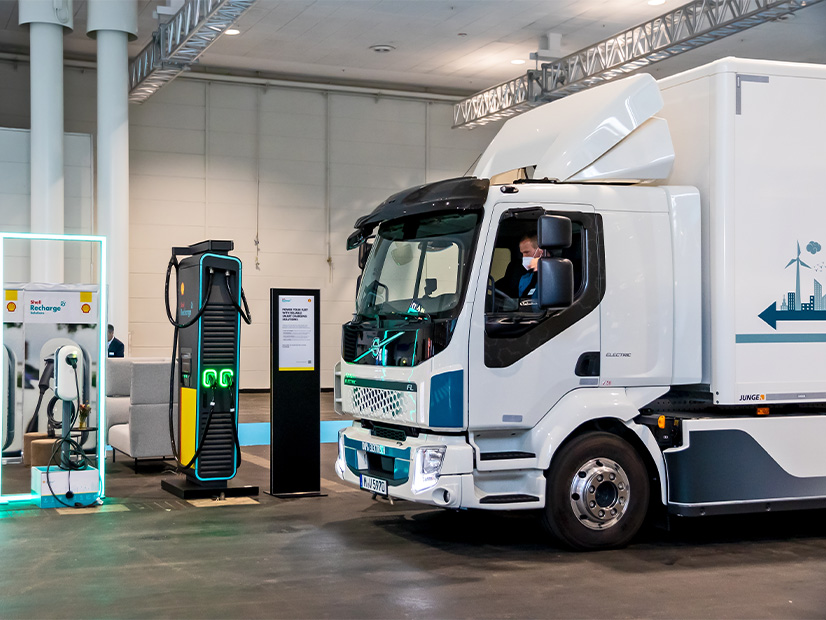
Despite federal funding uncertainties, West Coast state officials said they’re moving forward with plans for a tri-state truck charging network that was previously awarded $102 million from the Federal Highway Administration.
The West Coast Truck Charging and Fueling Corridor project will stretch across California, Oregon and Washington, with charging stations and hydrogen fueling sites for medium- and heavy-duty trucks, mainly along Interstate 5. The project is a joint effort of the California, Oregon and Washington departments of transportation and the California Energy Commission (CEC).
The CEC and California Department of Transportation (Caltrans) held a joint workshop Feb. 13 to gather feedback on a future solicitation for development of the charging and fueling stations.
“We do have an executed agreement with FHWA for this project,” Sarah Sweet from the CEC’s Fuels and Transportation Division said during the workshop. “So right now, we’re moving forward with what we have in our agreement and the federal guidance we have today.”
Still, Jimmy O’Dea, assistant deputy director for transportation electrification at Caltrans, acknowledged there’s been a lot of “news and commotion at the federal level” since the start of the Trump administration.
“All we can say at this point is that it’s a fluid situation that we are continuing to monitor very closely,” O’Dea said.
The project status also varies among the three states.
California and Oregon were able to get funding for the charging corridor project obligated before a federal funding freeze was ordered, but Washington did not, according to Tonia Buell with the Washington State Department of Transportation.
“Although the project was awarded and funding authorized, it wasn’t fully obligated and fully contracted,” Buell said during the workshop. “So we are kind of in a pause status until further guidance.”
Solicitation Planned
The project received a $102 million award from the FHWA in August from the Charging and Fueling Infrastructure (CFI) competitive grant program. (See West Coast Truck Charging Corridor Wins $102M in Federal Funds.)
Of the total funds, Washington and Oregon will each receive $21 million, which is expected to grow to $26 million with private sector money. The funds will go toward two charging sites for battery electric trucks and one hydrogen fueling station in each state.
California expects to have $67 million from the CFI award plus matching funds to cover 16 charging sites and one hydrogen fueling station. The stations will be located along I-5 and on certain other freight routes.
California has proposed inviting private entities, excluding investor-owned utilities, to apply for funding to develop the stations. The total award per applicant would be capped at $18 million, and applicants would be required to provide at least 50% in matching funds.
The CEC is accepting comments on the proposed solicitation through Feb. 27. The agency plans to release the solicitation in April, with applications due in August and funds awarded in early 2026.
What About NEVI?
The CFI program funding the West Coast charging corridor is separate from the National Electric Vehicle Infrastructure (NEVI) program, which aims to establish EV charging networks throughout the U.S. Both programs are funded through the Infrastructure Investment and Jobs Act.
The NEVI program requires states to submit EV charger deployment plans annually, which must receive approval from the federal transportation secretary before funding is obligated each year.
On Feb. 6, the FHWA issued a letter to state transportation department directors suspending approval of their NEVI deployment plans.
The agency said it’s updating its NEVI program guidance to align with U.S. Department of Transportation policy and priorities, including a recent order called “Ensuring Reliance Upon Sound Economic Analysis in Department of Transportation Policies, Programs and Activities.” The updated NEVI guidance is scheduled to be released this spring.
“Therefore, effective immediately, no new obligations may occur under the NEVI formula program until the updated final NEVI formula program guidance is issued and new state plans are submitted and approved,” the letter stated.
However, reimbursement of existing obligations will be allowed “in order to not disrupt current financial commitments,” FHWA said.
Regarding the CFI program, Sweet with the CEC said the agency has not received any updated guidance.
“Right now, we have an agreement and we’re moving forward, and we have not received any guidance or direction about pauses or freezes or anything like that for CFI,” she said.



